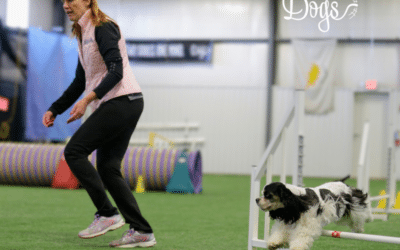Listening is one of the first traits we look for in a well-trained, well-adjusted dog. We associate it with good behavior, but if that’s the case, then the opposite must also be true, right? When our dogs don’t listen, it can be easy to take it as a sign of poor behavior, especially when you’re still forming a connection.
A lot of frustration comes from this perspective. It leads to us taking inattentiveness personally. The truth is your puppy isn’t trying to disrespect you when you call and they don’t come. In fact, acknowledging that is the first step to addressing it! To help you, we’re going to look at the reasons why many dogs don’t automatically listen during training, play, or general life.
We’re going to break down what you can do to build a connection that makes communicating effortless between you and your pup. Lastly, we’re going to examine the idea of making yourself valuable to your dog, and why that’s crucial to pet-owner relationships.
Let’s start with the root causes behind a dog not listening.
Connections start with meeting your dog’s needs
Dogs aren’t born thinking that listening to humans is valuable. Just like us, dogs have certain needs 一 food, play, sleep, companionship, etc. They will get those needs in the simplest way possible and those needs motivate them. They’re things inherently valuable to your dog.
In a previous post about getting your puppy to engage with you, we spoke about the importance of seeing the world through your pet’s eyes. The same principles apply to understanding their needs. When we show our dogs that we can meet their basic needs 一 and meet them consistently 一 we prove our value to them.
Don’t worry, this isn’t about making things transactional, it’s actually how people bond too! Proving our value signals a lot of our qualities to dogs: consistency, security, trust, care, attentiveness.
Over time, you’ll become so valuable to your dog that you develop a connection that looks almost magical to the outside world. At that point, your dog will listen to you purely because they want to. This is what the OneMind Dogs method is all about!
Rewards attach value to listening
Your dog will make an effort for the things they value, from food to praise to toys. Positive reinforcement teaches your dog to attach value to a certain behavior or action because it results in a reward.
This is also why treats aren’t as effective on a full tummy. An over-fed dog won’t respond to treats for training because that need is already met. Just like a dog that plays fetch for an hour or chases their doggy friend around the yard every morning likely won’t work for a toy reward 一 they’re played out!
Encourage behavior by timing rewards with needs
Feeding time is one of your dog’s favorite times of day, so make use of it! Not only are they ready for a tasty meal, but they’re extra receptive to food as a reward. It’s also a great time to build training into your daily routine.
Check your dog’s eating habits and try to change something to see what happens. Instead of giving them breakfast in a bowl, take the bowl outside or to the lounge area. Try some simple tricks or games to have them earn the food. This does two things:
- Stimulates your dog’s brain (a mentally stimulated dog is a tired, happy dog)
- Attaches value to interacting with you (paying attention becomes rewarding)
This works for playtime too. Instead of playing fetch, change to tug rope (or put the ball in an old sock) and become part of the game. Ask your dog to do something like run around a tree then reward them with a game of tug or a little rough-housing (if they enjoy that).
When you become part of the fun, you become more valuable. Check out some fun games you can play with your dog through our Foundation for Agility course in this video:
Build mutual trust over time
You may have guessed it by now, but the answer to having a dog that can listen even without rewards? Building your dog’s value for you.
Food, toys, and playtime are inherently valuable because your dog instinctively craves them. The trick is to show your dog that interacting with (and listening to) you is how they get those rewards. Over time, they transfer that value to you until you become just as valuable.
It’s not instant, and that’s okay. Building a connection means establishing mutual trust over time, and you’ll both enjoy the process of growing closer. Remember: actions speak louder than words for people, so imagine how canines view them.
Rewards will still be important, especially when learning something new. But you will have a dog that comes when you call them even without those rewards. Beyond training, your life with your dog will become so much easier 一 and more fun!
Download our FREE eBook to find out what makes the OneMind Dogs method so unique:



